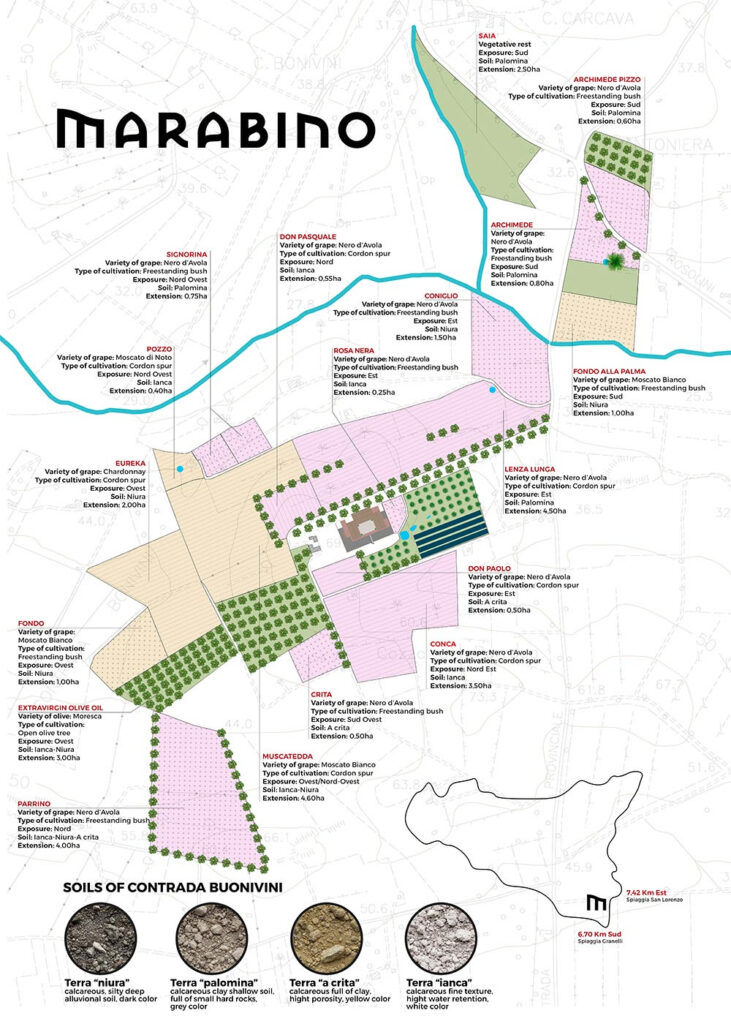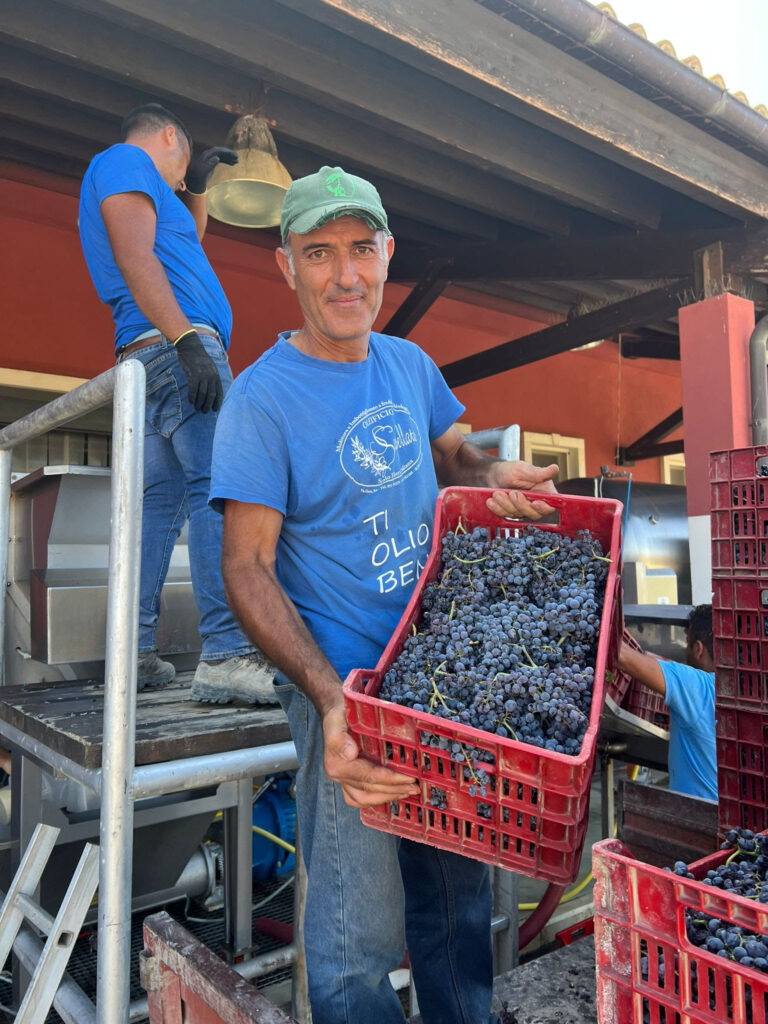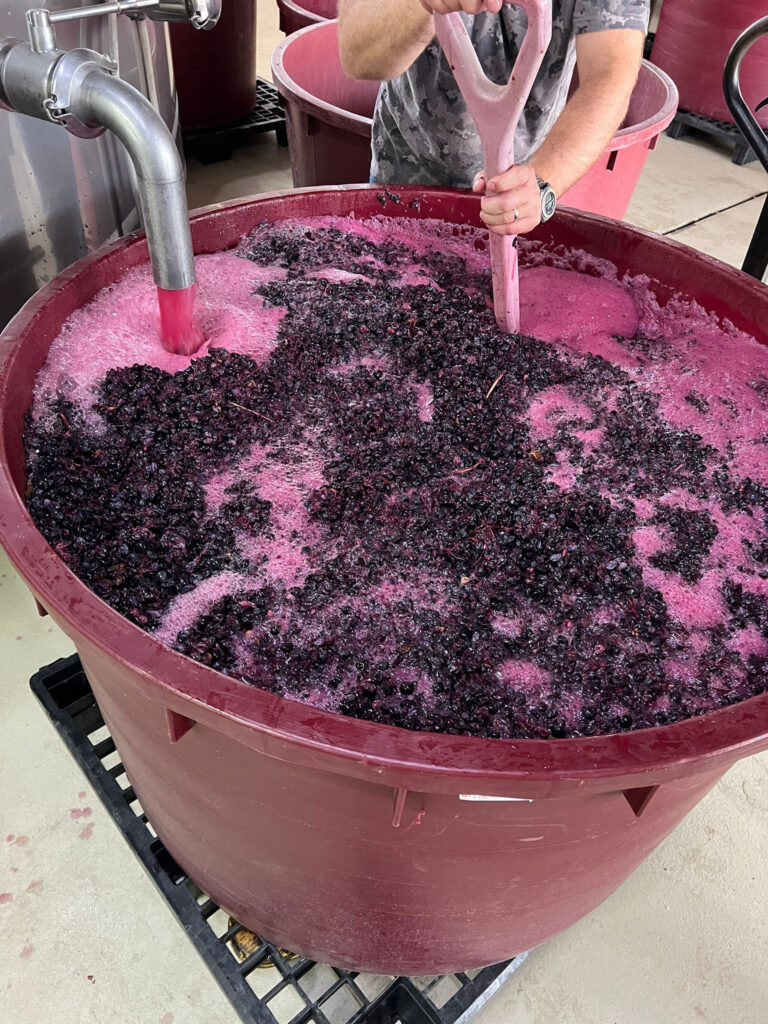Hello,
Here I am with our usual annual appointment, the one dedicated to the harvest just concluded, that of 2023.
A year whose winter was without rain but characterized by widespread humidity, which allowed our green manures to start growing quite well. Then March arrived: in two days we had 60 percent of the annual rainfall, a quantity of water that literally flooded our lands which fortunately held up well: the action of the roots of the green manures and of the preparation 500 which gives a colloidal structure on the soil, making it more draining and spongy, allowed our vineyards to withstand the impact, without particular landslides. This rain, although violent, brought a good boost to the vegetation. The soil benefited and the result was very lush green manure, with the shoots of the vines and fruit trees starting in an optimal manner.
Spring continued well throughout the month of April but in May, in full bloom and therefore during a delicate period for the vineyards, an unusual humid climate arrived, followed by some light rain. This pushed us to treat the vineyards with copper in a preventative manner in order to avoid having mold problems. This year, in much of Italy and Sicily, downy mildew has plagued the vineyards, leading to a drastic drop in production and compromising the quality of the grapes. Fortunately we have not had any problems with downy mildew on the bunches, only on some leaves in the “Vigna del Coniglio” which is located at the bottom of the valley. Unlike other areas, here the rains were short and not very intense, but the humidity, although unusual in this period, was often present.
On the basis of last year’s experience with the leafhopper problem (I talked about it in last autumn’s newsletter, do you remember?) we took preventive action, treating the vineyards with kaolin (rock dust) to inhibit the action of that insect. It went well. July was the hottest month ever recorded on Earth, in our territory we did not reach the peak temperature of 2021 but there were days so hot that they took our breath away, which slowed down the ripening processes of the vines. During the month of August the weather changed, the temperatures dropped, the air was decidedly cooler. For this reason we decided to wait a little longer for the white grapes this year: when we tasted the grains, the moscato seemed ripe as early as August 10th but it didn’t convince us aromatically, so we decided to wait a few more days before starting the harvest.

The first plot we harvested was Fondo alla Palma” on August 16th. We continued with the “Muscatedda” plot on August 18th and 19th, from August 21st to 23rd we moved to the “Eureka” vineyards and from the 24th to the 26th we completed the Muscat harvest, concluding with the grapes to be spread on racks in the sun for drying. The wait gave us grapes and musts with more sugar but even richer in aromas. Given the vintage, we kept the musts of the whites a little less on the skins, so as not to extract too much given the higher alcohol levels. In early September we started harvesting some parcels (“Coniglio”, “Rosa nera”, “Crita”) of “Nero d’Avola” for the rosé, the must of which was placed in barriques of different woods to ferment. The “Parrino” was harvested from 11 to 14 September, this vineyard always produces excellent grapes and this year as well the seeds were well ripe and the stalk well lignified, with very healthy and tasty grapes, with an excellent acid/savory balance.
As we officially entered autumn, the light began to change, at night the temperatures became increasingly cooler to the advantage of the aromas of the future wine: on September 23th we harvested the “Archimede”, we collected just 18.7 quintals of extraordinary quality and of great potential. A note: from recent research we have found that the Archimede vineyard is even older than we thought, the vineyard dates back to the 1950s and is therefore more than seventy years (!) old, it is the historical heritage of “Nero d’Avola” for our company and for our entire territory. On September 25th it was the turn of the last plots for the rosé (“Don Pasquale” and “Signorina”, whose calcareous soils lead to a later maturation than the clayey ones). The following day, the 26th, it was the turn of the “Don Paolo” vineyard. “Conca” and “Lenza Lungo” ripen later and later and so in the meantime we began hand-picking the olives for our extra virgin olive oil from “Moresca” and “Verdese” cultivars.
We have reached October, on the 5th we finished the “Conca” harvest and on October the 7th we concluded the harvest with the “Lenza Lunga” vineyard, both plots with calcareous soils facing east.

2023 was a complicated harvest for many of the wine producers I spoke with. The heat, the downy mildew and the hail created quite a few problems, compared to what I heard we defended ourselves well, we did not suffer any losses due to the downy mildew but we had a drop in production of around 20 percent due to the great heat of July. The grapes were very healthy but light, with smaller berries than usual.
All the fermentations, obviously started spontaneously (we never use selected yeasts), were slow but constant, without ever having reduction problems. As usual, we have parceled out the individual vineyards for both white and red, i.e. vinifying each plot individually in order to let all the grapes ripen as best as possible and to express the characteristics of the soil in the wine. The assembly takes place after the malolactic fermentations, when the wine is easier to understand, which is fundamental for understanding the many differences that even nearby vineyards can express.
The 2023 white wines are warmer and more enveloping than the latest vintages produced, losing freshness but gaining complexity. “Muscatedda” maintains its herbaceous style which recalls the Mediterranean scrub, with a less tannic but more multifaceted taste. “Eureka” is well balanced, savory and tasty. The Muscat produced from dried grapes that we will use for our liqueur had an optimal drying and the concentration of sugars helped a lot, giving a particularly rich wine. As I have already mentioned to you in past newsletters, we decided to produce our “Passito” as a liqueur Muscat: the distillery distilled the brandy obtained from the 2022 “Passito” to fortify the 2023 “Passito” wine. For us, therefore, a project for a new wine was born, with a style more oriented towards the end of the meal, the wine will be called “Uvalsole”, I will tell you about it in more detail in the next newsletters.
As regards the “Nero d’Avola”, it was a vintage in which the slow maturation concentrated less sugar than the whites, with average freshness. The rosé is a product that always requires a lot of work, we obtained it from different plots: “Coniglio” and “Creta” for the clayey soils, “Rosa nera”, “Signorina” and “Don Pasquale” for the calcareous soils. The musts fermented in barriques of various types of wood and in amphorae, where they will remain until next spring. “Rosanera” is always a highly appreciated wine, 2022, despite a particularly significant production, ended even before the end of the summer. This year is the third time that “Rosanera” has fermented and matured in wood, a choice that satisfies me very much for the results obtained, I believe we have managed to give more complexity and pleasantness to a product that is delicate by nature.

“Nero d’Avola” wines from clayey soils maintained good freshness and typical fruity scents, those from calcareous soils took longer to wait and as usual led to wines with important freshness and typical floral and mineral scents.
I am happy with this harvest. The reading of the white grapes has worried us, but pushed us to search for the right ripeness; for the red grapes it was simpler since we were able to wait without ever having to worry about bad weather: the autumn was very hot, almost like a second summer.
During the harvest we received splendid news, the Slow Wine guide of Slow Food, in addition to awarding our “Terre Calcaree” 2021 as a Top Wine – that is a wine that achieved excellence in tastings – awarded the Marabino winery the Slow Food Snail of Approval, a recognition for the way in which wineries interpret organoleptic, territorial and environmental values associated with excellent wine quality. Only 16 wineries have this recognition in Sicily at the moment, and we are the first winery in the area to receive it. Something that fills us with pride for the work done so far and which gives us confidence for the future of the wines of the territory of Noto.
See you soon,
Pierpaolo Messina
